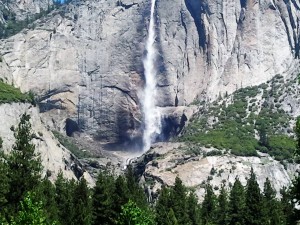Those who want to kill me will be destroyed; they will go down to the depths of the earth. They will be given over to the sword and become food for jackals. But the king will rejoice in God; all who swear by God will glory in him, while the mouths of liars will be silenced (63:9-11 NIV).
Though in soul-refreshing, heart-encouraging experience of personal fellowship with the living God, David in fact was still in a dry and weary land (63:1 NIV). This is life in this fallen world. Our God has plans he acts toward, and they involve keeping and sustaining his dearly loved people in unpleasant situations. Yet David confidently expected God to act in his dangerous state. On the run from his enemies, he did not abandon his hope. Since he is able to draw near to God, he is confident. This is the benefit of knowing God according to his revelation of himself in the Scriptures. Outward circumstances may not improve, they may even get worse. But believers in God are certain of the ultimate triumph of God, his truth, and that they will share in that victory.
On the one hand, David was certain of the defeat of his enemies. If this refers to the revolt of Absalom, his enemies had a decided military superiority. The plot had been well-laid. David and his men had been taken by surprise. But Absalom’s advantage would disappear, and David’s enemies would be defeated. Observe that David envisioned a battle: given over to the sword. He did not expect to escape without a fight. Confidence in God should never promote a lazy, careless attitude. God’s sovereignty does not eliminate human responsibility. Jackals “are the final scavengers, consuming the remains of the kill rejected by larger beasts. The wicked are, in other words, the very leavings of mankind” (Kidner). No one cares about their graves.
Notice the justice of God. David’s enemies plotted to throw off their lawful king, the one anointed by God as their leader. So then, God threw them aside for everlasting contempt. Unlike Absalom and his fellow rebels, many evil people escape justice in this world. But they cannot escape the final Judgment Day. God chose to make David’s enemies an example of what will surely happen to his enemies.
On the other hand, David was confident of his victory and of all who know the Lord. He looked forward to being able to rejoice in God, along with all those who were faithful to the Lord. Notice that David called himself the king. While this provides us information about the time of this psalm, it does more than that. David expected victory because he knew that God is always faithful to his covenant promises. God had said that he would build a house for David (2 Samuel 7:1-17; 1 Chronicles 17:1-15; cf. Psalm 89:1-2; Isaiah 55:3-4). Much in God’s plan depended on David’s safety, so David could be confident.
We should also claim God’s covenant promises (Hebrews 8:8-13). Events might look bleak; any outward confidences might disappear, but God’s promises cannot fail!
Grace and peace, David

